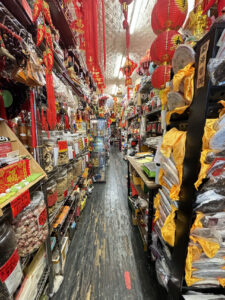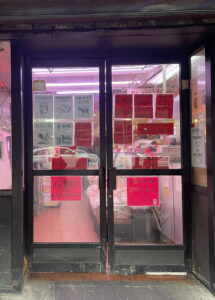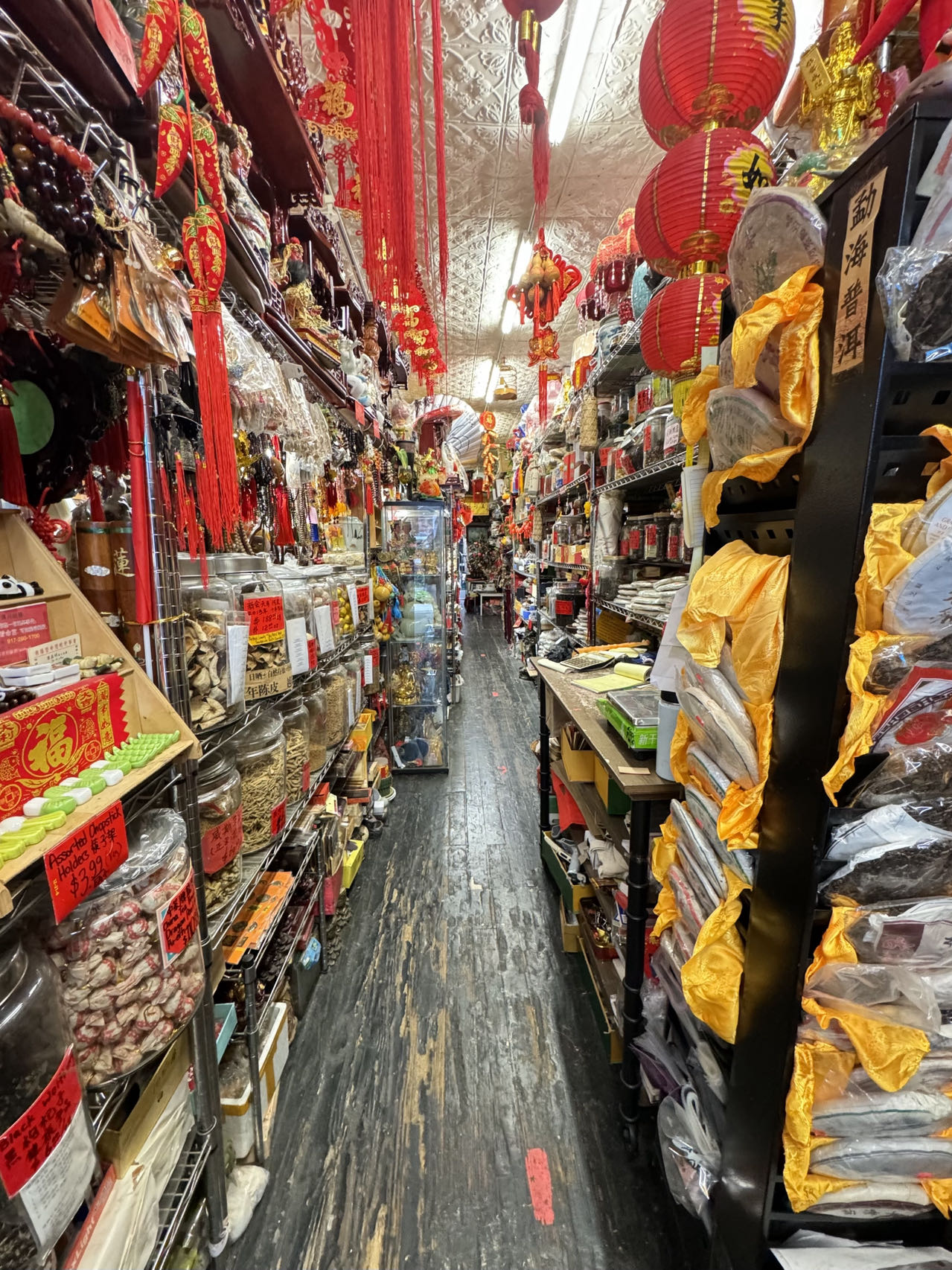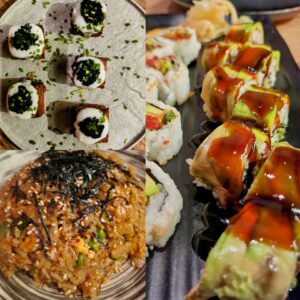Despite its robust history spanning over a century, Chinatown faces ongoing sustainability struggles as store owners age.
According to a 2023 report by NYC Small Business Services, created in collaboration with Chinatown BID and Think!Chinatown, Chinatown storefront vacancy rate reached 21.4% from 2021 to 2022, surpassing the citywide average of 13% in 2021.
But these second-generation Asian Americans are stepping in to preserve the fabric of Chinatown.
One particular model of this rejuvenation is Grand Tea & Imports. It was established in 2006 by Mr. and Mrs. Liu (who prefer not to use their full names) first as a tea shop, and later merging with a Chinese ritual goods and antiques shop. The store faced unprecedented challenges in 2020 as COVID-19 and gentrification jolted Chinatown businesses, followed by a devastating fire that tore down their previous location.

This is when their daughter, Alice Liu, 29, stepped in to not only ease pressure off her parents’ shoulders, but also to connect the younger generation of Asian-Americans with traditional Chinese culture.
“Asian Americans of all ages [who are] English [speakers] lack the ability to connect with these Chinese cultural goods,” said Alice. “What I saw was really that hole [to fill], that language and cultural translation of our goods so that it doesn’t seem so intimidating and esoteric.”
To Alice, growing up in Chinatown gave her the privilege to form a clear sense of her Chinese identity. But for those who didn’t, she believes that creating this type of space is extremely important, as it establishes “a sense of belonging and continuance of traditions.”
She employed various strategies to diversify the store’s appeal to young people and Westerners. “We’ve [created] things that are more aesthetically beautiful or well-packaged, with leaflets [containing] information on the products,” said Alice during a phone interview as she was packing a Taishan Sijiu black tea.
Alice and other children of local business owners are also turning to social media platforms, such as Instagram and YouTube, to spotlight their businesses to a wider audience.
Additionally, she has organized various events with local non-profit organizations like Think!Chinatown. These events included performing tea ceremonies while reciting poetry, tea tasting, and offering their tea as a raffle prize.
Altar rituals, a Chinese ceremony that worships gods and ancestors, were also hosted. “I talked about the significance of different things in an altar and what is the etiquette around an altar and the symbology behind it,” said Alice.
By organizing these events in collaboration with local non-profits and showcasing the family business on social media, this new generation of business owners aim to attract a younger demographic, as well as Westerners.
“We’re looking to be part of this neighborhood and collaborating and telling stories and building a more close knit neighborhood,” said Alice. “It’s about creating more human connections.”
Similar to Alice, Jefferson Li, 31, a former Coast Guard member, stepped in to work at 47 Division St Trading Inc. during the pandemic.
“My parents are older, so they were more at risk [of contracting] COVID,” said Li, whose family established the meat shop in 1995.
Like many businesses during the pandemic, the meat shop was without customers. “Wholesale pretty much just evaporated overnight when the city shut down all of the restaurants,” said Li. “Retail was difficult as well, because nobody came out into Chinatown anymore.”
To save the store, Li turned to Reddit. Under the username “meat boy” (now SleepyLi), he sold meat at remarkably low prices, as reported by the Wall Street Journal..
“We [worked] with a lot of [grassroots] organizations that were able to actually buy wholesale from us,” said Li. “They’ll either give it out for free to the communities in need, or they would use it to make meals and then provide meals for free.”
Although the store has seen its finances improve post-pandemic, it still struggles due to inflation. Despite the challenges, Li envisions himself remaining in the store for years to come. “I really find it difficult to separate my family from the business, just because our family’s lives are [centered] around it,” said Li. “So I can’t really see my family without it.”

Asian American entrepreneurs are also playing a vital role in preserving the neighborhood.
Sandy Truong, 32, a Chinese-Vietnamese American, co-founded the Dreamers Coffee House in January 2020 on Henry Street with her business partner, Daniel Lam. Truong and Lam, who worked at a senior center, stumbled upon the storefront for rent and began envisioning its transformation into something meaningful.
“It’s a really nice, charming spot in this neighborhood, where there’s young professionals living here, or aunties and uncles,” said Truong. “[We thought] maybe we can create a space where we can have these two demographics be together.”
The café features drinks inspired by Chinese culture, such as their osmanthus latte that was introduced in the spring. “When we would go out to have dim sum with our parents, in the carts, they would have osmanthus cake,” said Truong. “So I was like, let’s make a syrup out of that. Then we can make it into a drink that reminds us of our childhood and how we grew up.”

Community organizations have also partnered with stores to boost their revenue.
One of them is Send Chinatown Love (SCL), a volunteer-based organization founded in 2020 in response to businesses’ inequitable access to government funding.
Another, “Gift-a-Meal,” is a double-impact campaign that aims to uplift businesses and provide meals to low-income communities.
SCL would donate money to local small businesses, and “create a certain amount of meals,” said Nanxi Yang, 28, the product design lead. “We’ll [then] partner with local community-based organizations that help distribute those meals to elderly populations, schools, or people who need them.”
Jeff Eng, 36, SCL’s Merchant Experience Lead, said it’s been really inspiring to see second-generation business owners uplifting Chinatown.
“I want the mom and pops who have amazing eats at affordable prices,” said Eng. However, these foods are often subjected to the stigma of being cheap and low quality. “So you have these second generation businesses too that are kind of helping to elevate the perception of Asian and Asian American food,” said Eng. “We love all [of] our Chinatown businesses and want them to see them thrive.”
For these Asian Americans, there’s one common goal in mind: to preserve Chinatown for generations to come.









